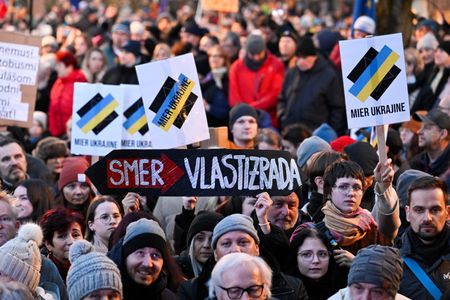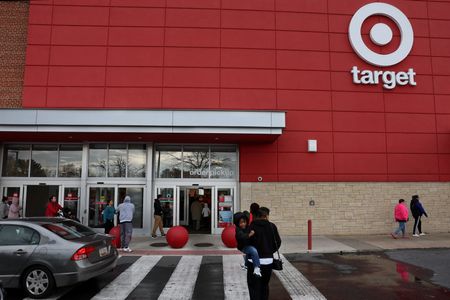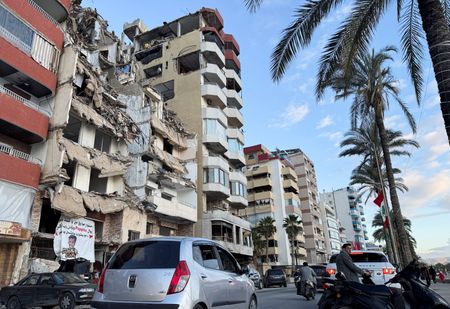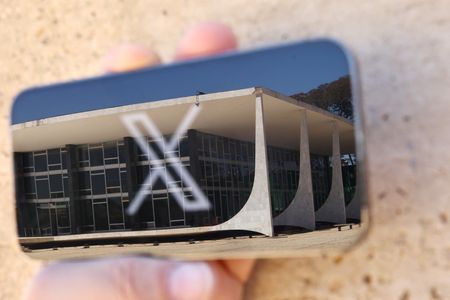By Radovan Stoklasa
BRATISLAVA (Reuters) -Tens of thousands of protesters thronged a central square in the Slovak capital on Friday, waving banners opposing Prime Minister Robert Fico’s policy shift closer to Russia, after tensions between the government and the opposition rose.
Organisers estimated 60,000 people attended the demonstration in Bratislava’s Freedom Square, about four times more than in the last demonstration two weeks ago.
The protests were nearing levels seen in 2018 when the murder of an investigative journalist caused mass demonstrations and forced Fico’s resignation. Fico won reelection as prime minister in 2023.
Protesters shouted “Enough of Fico” and “We are Europe” and at one point lit up the square with their mobile phones after a brief power outage.
Rallies were also held in 20 other cities, with news website Dennik N estimating at least 100,000 protested across the central European country.
Tensions have built this week, after Fico’s leftist-nationalist government attacked his progressive opponents, accusing them of attempting to cause chaos.
The government plans new preventive measures amid what Fico said were plans to escalate protests into attempts at illegally overthrowing the government, including by occupying state buildings.
Citing information from intelligence services, Fico has alleged, without showing evidence, there was a group of unidentified experts in Slovakia that had helped in protests against a pro-Russian leader in Ukraine in 2014 and Georgia last year.
Opposition political parties and civic groups organising the protests have rejected the accusations, saying they are meant to deflect attention from policy problems that the fragile government coalition is failing to tackle.
Opposition parties have sought a no-confidence vote against Fico’s government, but Fico has so far looked set to survive the vote as he maintains a thin majority.
Fico, since his return as prime minister for a fourth time in 2023, has sparked worries among critics that his government is weakening democratic values and shifting foreign policy away from European Union and NATO allies and closer to Russia.
“We do not want to be with Russia… We want to be in the European Union, we want to be NATO and we want to stay that way,” protester Frantisek Valach said in Bratislava.
The latest round of protests come after Fico privately travelled to Moscow in December to meet Russian President Vladimir Putin, a rare encounter for an EU leader since Russia invaded Ukraine in 2022.
Marian Kulich from civic group Mier Ukrajine (Peace to Ukraine), which organised the protests, said the aim was to “create pressure so that this government actually changes its direction towards Moscow and focuses” on EU and NATO partners.
Fico became increasingly anti-liberal after 2018. In May last year, a lone gunman shot and wounded Fico, protesting against his policies, and Fico has stepped up attacks against the opposition since then.
He has also been in open dispute with Ukraine after Kyiv halted the transit of Russian gas supplies heading to Slovakia on Jan. 1, and he has threatened to end humanitarian aid in retaliation.
His government ended state military aid to Kyiv after taking office, and domestically it has also revamped the public broadcaster despite media freedom concerns and softened prosecution of economic crimes, drawing protests last year.
Fico has defended his government’s foreign policy saying it worked in all directions, and while critical of some EU policies, he has said policy was still determined by EU and NATO membership.
(Reporting by Radovan Stoklasa in Bratislava and Jason Hovet in Prague; Editing by Sharon Singleton, Leslie Adler and Diane Craft)














